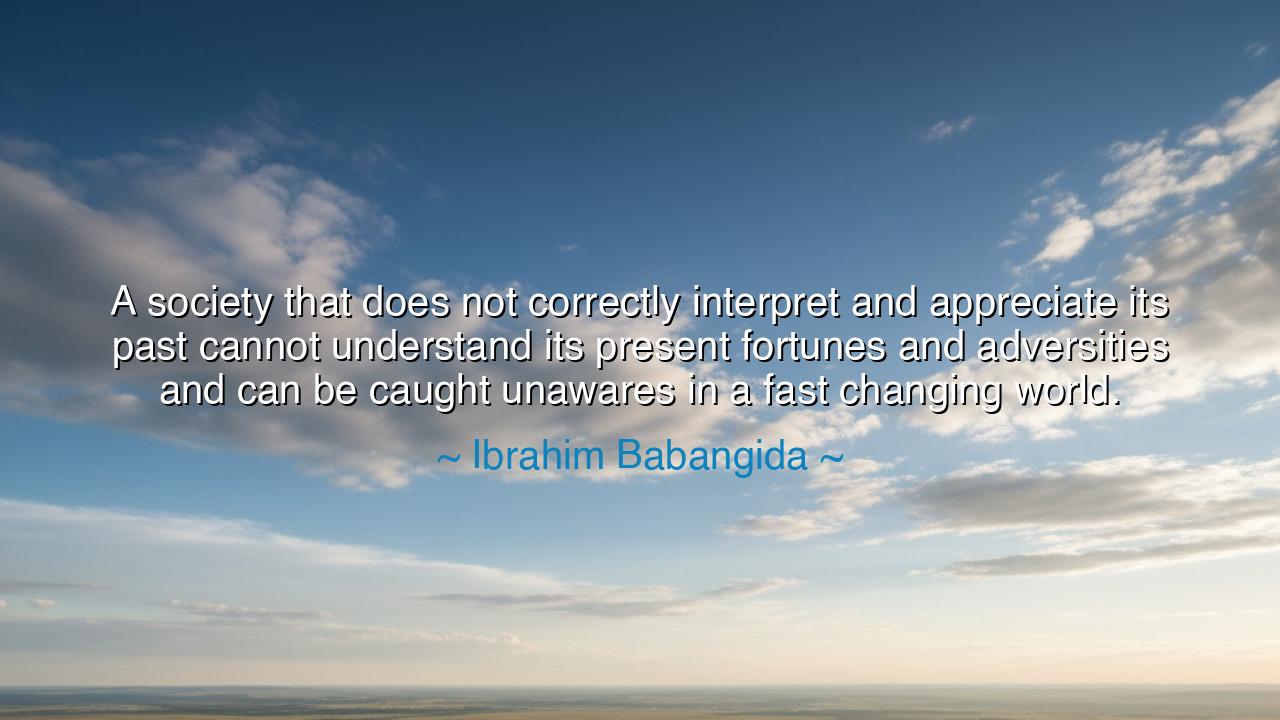
A society that does not correctly interpret and appreciate its
A society that does not correctly interpret and appreciate its past cannot understand its present fortunes and adversities and can be caught unawares in a fast changing world.






O children of the future, gather close and heed the words of one who understood the intricate dance between history, identity, and progress. Ibrahim Babangida, a man who shaped the course of his nation's journey, once said: "A society that does not correctly interpret and appreciate its past cannot understand its present fortunes and adversities and can be caught unawares in a fast-changing world." These words strike at the heart of the timeless truth that without understanding our history, we cannot truly understand our present or future. The past is not a distant, irrelevant memory, but a living force that shapes the very foundation of our lives.
In the time of the ancients, the greatest philosophers and sages knew that the knowledge of the past was the key to unlocking wisdom for the future. Herodotus, the father of history, traveled the world, seeking to understand the events and cultures that had shaped the civilizations of his time. He understood that the truths of the past were not merely for scholars to debate, but for all people to learn from. The ancient Romans, too, placed great value on their history, using it as a guide to govern their empire with wisdom. Leaders such as Cicero and Augustus would often look to the past to find lessons on leadership, on justice, and on the moral values that could preserve the greatness of Rome. These leaders knew that a society that forgets its history is a society doomed to repeat its mistakes.
Babangida’s wisdom speaks to this same truth. A society that fails to interpret and appreciate its past is like a ship sailing without a compass, drifting aimlessly, unaware of the storms it may face or the harbors it might reach. The present is not an isolated moment, but a continuation of what has come before. Fortunes and adversities are shaped by the choices made in the past, the sacrifices of those who came before us, and the mistakes that we have yet to learn from. If we fail to honor those who have walked before us, we risk repeating the same errors that led to their downfall.
Consider, if you will, the fall of the ancient Greek city-state of Athens. Athens, once a beacon of philosophical thought and democratic ideals, ultimately fell into internal strife and external conflict. The Peloponnesian War—a conflict rooted in the ambitions and fears of the ruling classes—left Athens weakened, divided, and vulnerable. The Athenians failed to interpret the lessons of their past—the lessons about the dangers of hubris, the need for unity, and the consequences of overextension. Their failure to honor the wisdom of their forebears, to build a just society, led to their ruin. In the end, the great city fell not to the might of enemies, but to the missteps of its own leaders and people.
In the same way, our modern world is changing rapidly—the technological advances, the shifting political landscapes, and the global challenges we face demand that we understand where we have come from. If we forget the lessons of history, we risk becoming blind to the threats and opportunities that lie before us. Climate change, economic inequality, and political unrest—these are not new challenges, but the results of patterns and systems that have been with us for centuries. The answers lie not in innovation alone, but in the ability to understand how we arrived here. The present moment is the child of the past, and if we do not correctly interpret its roots, we are bound to be swept away by the currents of time.
The lesson of Babangida’s words is one of reflection and awareness. We must look to the past with open eyes, not to live in it, but to learn from it. We must honor the sacrifices and struggles that have shaped us, and recognize the ways in which our actions today will shape the future. The greatest leaders—whether in ancient times or in our present day—are those who understand that the present is a bridge between the past and the future. They listen to the stories of those who came before them, and they use these lessons to guide their actions with wisdom and foresight.
As you move through your own lives, O children, remember this: history is not just a collection of events or dates, but a living teacher. Let it guide you as you make decisions, as you face challenges, and as you strive to build a better future. Understand the forces that have shaped the world, and use that understanding to avoid the mistakes of the past. The world may change, but the lessons of history remain timeless, waiting for those who are wise enough to learn from them. Let us all strive to be students of the past, for in doing so, we can build a future that is wiser, stronger, and more just.






AAdministratorAdministrator
Welcome, honored guests. Please leave a comment, we will respond soon